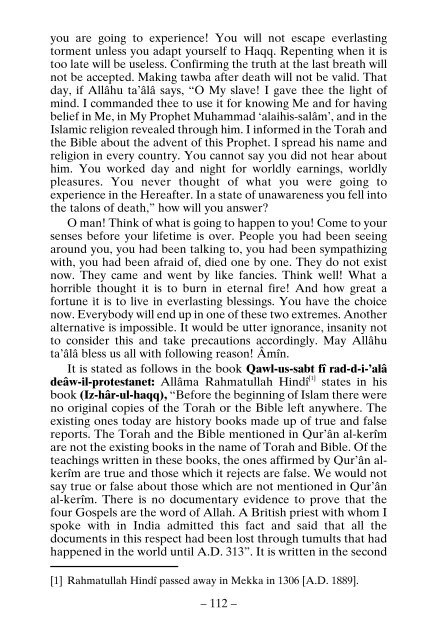Confessions Of A British Spy
Muhammad of Najd was the sort I had been looking for. For his scorn for the time’s scholars, his slighting even the (earliest) four Khalîfas, his having an independent view in understanding the Qur’ân and the Sunna were his most vulnerable points to hunt and obtain him. So different this conceited youngster was from that Ahmed Efendi who had taught me in Istanbul! That scholar, like his predecessors, was reminiscent of a mountain. No power would be able to move him. Whenever he mentioned the name of Abû Hanîfa, he would stand up, go and make an ablution. Whenever he meant to hold the book of Hadîth named he would, again, make an ablution. The Sunnîs trust this book very much. Muhammed of Najd, on the other hand, disdained Abû Hanîfa very much. He would say, “I know better than Abû Hanîfa did. In addition, according to him, half of the book of wrong.
Muhammad of Najd was the sort I had been looking for. For
his scorn for the time’s scholars, his slighting even the (earliest)
four Khalîfas, his having an independent view in understanding
the Qur’ân and the Sunna were his most vulnerable points to hunt
and obtain him. So different this conceited youngster was from
that Ahmed Efendi who had taught me in Istanbul! That scholar,
like his predecessors, was reminiscent of a mountain. No power
would be able to move him. Whenever he mentioned the name of
Abû Hanîfa, he would stand up, go and make an ablution.
Whenever he meant to hold the book of Hadîth named he would, again, make an ablution. The Sunnîs trust this book
very much.
Muhammed of Najd, on the other hand, disdained Abû Hanîfa
very much. He would say, “I know better than Abû Hanîfa did.
In addition, according to him, half of the book of wrong.
You also want an ePaper? Increase the reach of your titles
YUMPU automatically turns print PDFs into web optimized ePapers that Google loves.
you are going to experience! You will not escape everlasting<br />
torment unless you adapt yourself to Haqq. Repenting when it is<br />
too late will be useless. Confirming the truth at the last breath will<br />
not be accepted. Making tawba after death will not be valid. That<br />
day, if Allâhu ta’âlâ says, “O My slave! I gave thee the light of<br />
mind. I commanded thee to use it for knowing Me and for having<br />
belief in Me, in My Prophet Muhammad ‘alaihis-salâm’, and in the<br />
Islamic religion revealed through him. I informed in the Torah and<br />
the Bible about the advent of this Prophet. I spread his name and<br />
religion in every country. You cannot say you did not hear about<br />
him. You worked day and night for worldly earnings, worldly<br />
pleasures. You never thought of what you were going to<br />
experience in the Hereafter. In a state of unawareness you fell into<br />
the talons of death,” how will you answer?<br />
O man! Think of what is going to happen to you! Come to your<br />
senses before your lifetime is over. People you had been seeing<br />
around you, you had been talking to, you had been sympathizing<br />
with, you had been afraid of, died one by one. They do not exist<br />
now. They came and went by like fancies. Think well! What a<br />
horrible thought it is to burn in eternal fire! And how great a<br />
fortune it is to live in everlasting blessings. You have the choice<br />
now. Everybody will end up in one of these two extremes. Another<br />
alternative is impossible. It would be utter ignorance, insanity not<br />
to consider this and take precautions accordingly. May Allâhu<br />
ta’âlâ bless us all with following reason! Âmîn.<br />
It is stated as follows in the book Qawl-us-sabt fî rad-d-i-’alâ<br />
deâw-il-protestanet: Allâma Rahmatullah Hindî [1]<br />
states in his<br />
book (Iz-hâr-ul-haqq), “Before the beginning of Islam there were<br />
no original copies of the Torah or the Bible left anywhere. The<br />
existing ones today are history books made up of true and false<br />
reports. The Torah and the Bible mentioned in Qur’ân al-kerîm<br />
are not the existing books in the name of Torah and Bible. <strong>Of</strong> the<br />
teachings written in these books, the ones affirmed by Qur’ân alkerîm<br />
are true and those which it rejects are false. We would not<br />
say true or false about those which are not mentioned in Qur’ân<br />
al-kerîm. There is no documentary evidence to prove that the<br />
four Gospels are the word of Allah. A <strong>British</strong> priest with whom I<br />
spoke with in India admitted this fact and said that all the<br />
documents in this respect had been lost through tumults that had<br />
happened in the world until A.D. 313”. It is written in the second<br />
[1] Rahmatullah Hindî passed away in Mekka in 1306 [A.D. 1889].<br />
– 112 –


